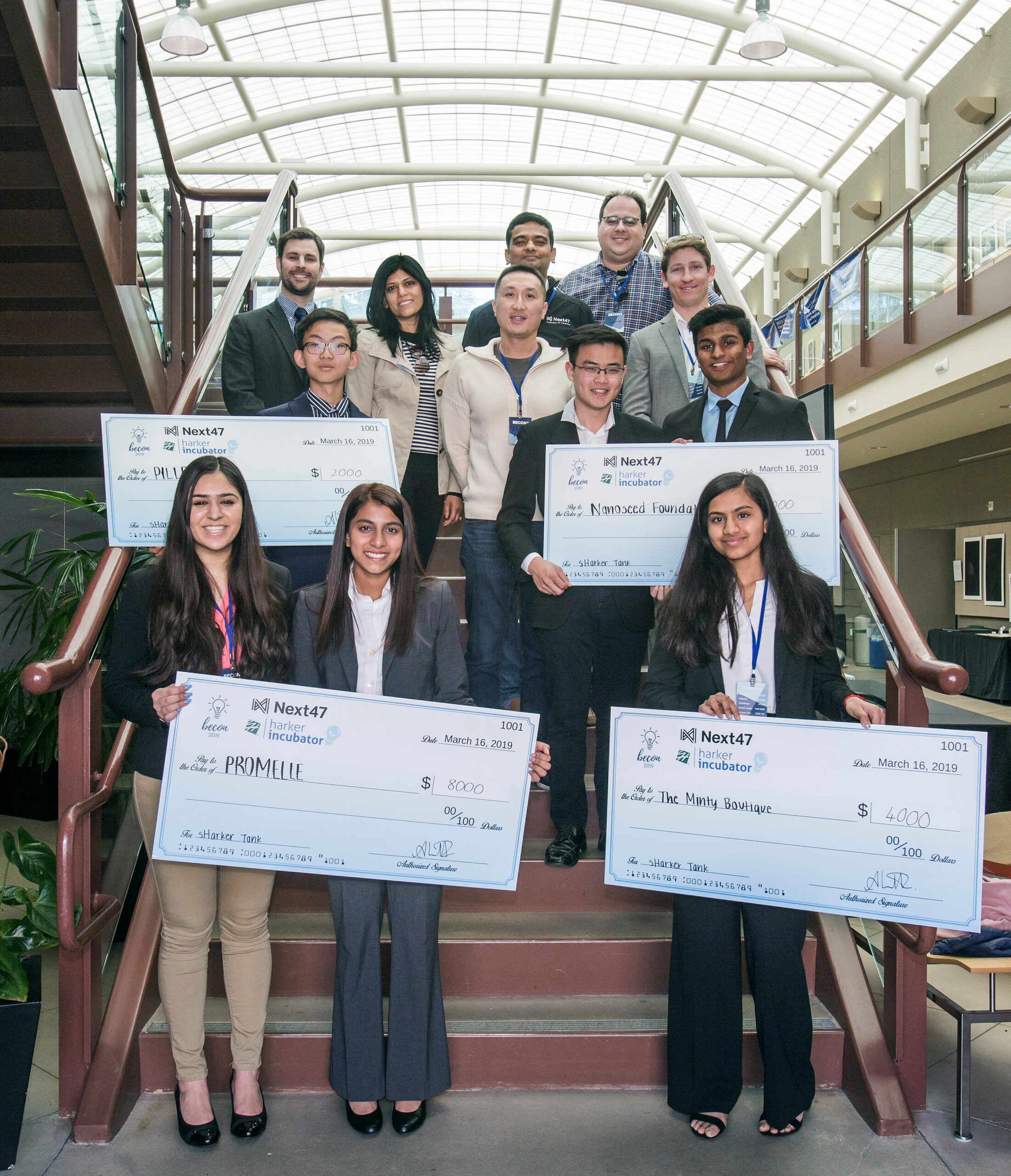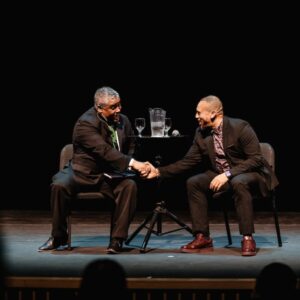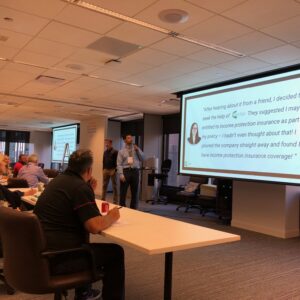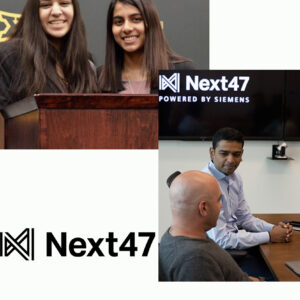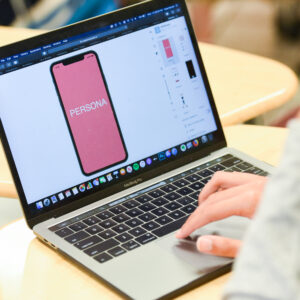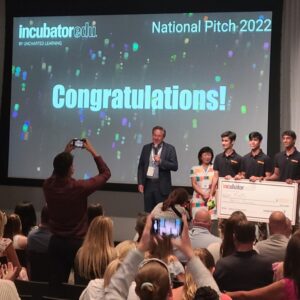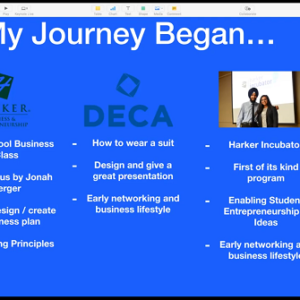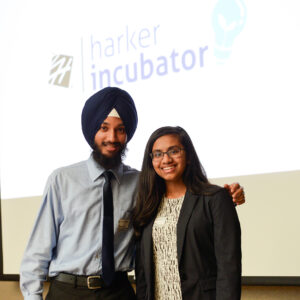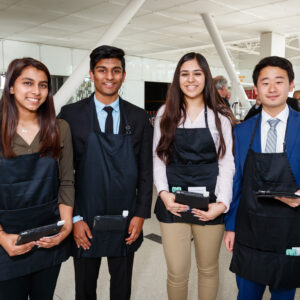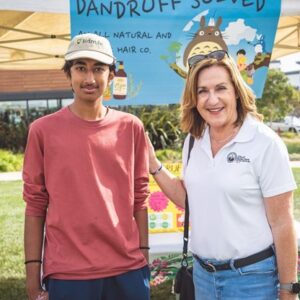The business & entrepreneurship department launched two incubator courses this school year, and the young entrepreneurs have been going full tilt all year. Here is a quick look at the first year of these classes. Watch for a full length feature article on the classes in the winter issue of Harker Magazine in December 2019.
In summer 2017, Harker’s business and entrepreneurship department held an incubator class for high school entrepreneurs, one of the first in the nation. The class was an intensive, student-led and community-supported program in which student entrepreneurs received a seed grant, mentorship, academic curriculum and internal support from a student leadership team to help them develop and grow their startup companies. The class was so successful and well received it was converted into a full academic class for the 2018-19 school year. Read about the 2017 class here.
The two new academic incubator classes began in fall 2018: Honors Entrepreneurship: Startup Incubator 1 and Honors Entrepreneurship: Startup Incubator 2.
In Incubator 1, students created and commercialized their own product or service. “Teams are led through the Lean Startup processes of developing hypotheses about a business concept, testing those hypotheses, adapting and continually iterating,” said Michael Acheatel, business & entrepreneurship teacher. “Once students have validated their business concept hypothesis, they receive a seed grant to propel their business plan into reality, thereby learning business foundations in entrepreneurship, marketing, economics, finance and business operations firsthand. “
Incubator 2 is geared toward students who have already launched a company and are focused on growing their business. “Students are led through three-week long ‘sprints’ where students identify their individual goals and tasks at the beginning of the sprint and present a demo of their accomplishments at the end of the sprint,” said Acheatel.
Students in each of the courses receive coaching and mentorship from entrepreneurs, investors and business experts who visit the classes. Students also get out to visit with Bay Area startups and venture capitalists to experience entrepreneurship at the next level. “We had eight student companies complete the course this year and enrollment for next year is growing rapidly,” said Acheatel.
A key element in the classes was provided by Next47, a venture capital firm. The company supported the program as an essential part of education and donated $10,000 in venture funds. “We believe that entrepreneurial skills are life skills,” said Lak Ananth, CEO and managing partner of Next47. “Being passionate about an idea, taking the time to think through it, market it, and have the wherewithal to see it through – these are skills that are necessary to succeed in life. Exposing kids to this process is incredibly valuable. Even if these businesses don’t succeed, the process will inculcate in them the fire to keep getting better.”
Mentors are a critical element of the entire process and Phu Hoang has contributed his time to helping two of the ongoing ventures climb the ladder to success. He has been working with Mahi Kolla, grade 11, founder of The Minty Boutique, and Nishka Ayyar ’19 and Riya Gupta ’19, founders of of PromElle, to refine and channel their efforts as they expand their businesses.
“Mahi is an extraordinarily gifted young woman,” said Hoang. “She is hard-working, a very fast learner, and has tremendous passion for her company. It’s just so rare to see that at such a young age. What has been such a pleasure mentoring Mahi is that she can understand and soak in complex advice and suggestions and builds a plan to execute on them. I feel like my mentoring of Mahi is at the same level of strategic thinking and complexity as my mentoring of much older and more experienced founders of venture-backed companies.”
PromElle, Ayyar and Gupta’s venture, also has been around a couple of years. “PromElle is a more mature business than the Minty Boutique,” said Hoang, noting both women have now graduated. “They had done a lot of things right before I got involved. First of all, the idea of PromElle is brilliant and very needed. But they actually market-tested the concept by hosting a prom dress exchange at Harker when they were freshmen to test their idea. Most adult entrepreneurs don’t test their ideas that effectively. Once they got clear confirmation of the value that they can bring, they were able to get app development help at a very reasonable cost.”
Hoang, who holds a Ph.D. in electrical engineering and computer science from the University of California, Berkeley, and was an early engineer at Yahoo, noted he has been working in technology all his life. “I enjoy working with entrepreneurs to help them realize their vision, build their products and grow their businesses. My son joined Harker as a freshman in 2017, and I got to see how advanced and entrepreneurial the kids are, so I reached out to Michael at some point to offer to contribute.”
This year, Incubator 1 startups included Sero, started by Cameron Jones ’19, an intelligent bike assistant with anti-theft and fitness tracking capabilities; PeerCoco, by Sayon Biswas ’19 and Nemo Yang ‘19, which is a peer-to-peer college consulting network for international high school students; GetTime, started by Claire Luo, grade 10, a student-focused time-management app that allows users to input tasks, set timers and track progress in a gamified manner; and PolyForm, the brainchild of Nakul Bajaj, grade 11, who is developing a platform for voters to answer polls and discuss policy at the local, state, and national level in civilized manner.
At the beginning of the year, these students identified problems they and other students face in daily life or that they see in the world. “They begin to assess the problem from a business perspective by looking at how these problems are currently being solved (competitive analysis) and identifying who has these problems (market analysis),” said Acheatel. Students then conduct customer interviews to validate their assumptions, then begin the solution ideation process to conceptualize their proposed solution, noted Acheatel.
In February, students pulled their projects together and pitched to a panel of investors for funding to develop a prototype of their product, known as the minimum viable product (MVP). “All four [Incubator 1] companies successfully raised seed funding and have since developed their prototypes,” Acheatel noted. “Now that the entrepreneurs have had three months to develop their products, they will pitching to investors in late May for funding to fully launch their companies,” he said.
There were also four Incubator 2 companies. The Minty Boutique, a luxe stationery company that utilizes unique designs and functional products to cater to the #BOSS lifestyle; PromElle, the first peer-to-peer marketplace for teen fashion where teen girls can lend/rent or buy/sell formal, party and everyday wear; Nanoseed, developed by Jason Huang ’19 and Suraj Pakala ’19, a nonprofit organization in the field of microfinance that empowers rural Chinese farmers to form cooperatives and build sustainable businesses; and PillBot, being developed by Johnny Wang ’19 as an automated solution to medicine dispensary with a tamper-proof design and overdose protection.
Each Incubator 2 company pitched at sHarker Tank – BECon for $15K in prize money provided by venture firm Next47. Read all about that effort here.
PromElle took first place at sHarker Tank BEcon and presented at the Association for Corporate Growth Silicon Valley’s 2019 GROW awards. Officers are currently in communication with SharkTank about appearing on their show.
The Minty Boutique took second place at sHarker Tank BEcon and was written up in a blog post by Stukent. Kolla is excited about the year’s progress. “In August through September, we launched our first iteration of our academic planners which sold out within a week,” she said. “From there, we reached out Harker to become the new manufacturer of the Harker academic planners. We are currently working with the freshmen class dean and the Office of Communication to finalize this partnership.”
PillBot took third place at sHarker Tank BEcon and received funding and support from various nationwide competitions. Wang found the class valuable for his development needs. “The class provided a good framework for the students to build and grow their businesses,” he said. “The curriculum gives us enough flexibility so we can focus on individual business goals. The majority of instruction is not done by lecturing but one-on-one mentoring with both teachers within the B&E department and external mentors. By leveraging on the Harker alumni/parent network, we are able to learn much more than just listening to lectures.”
Nanoseed earned fourth place at sHarker Tank BEcon and has grown to more than 20 branches. It held a benefit concert that raised $9,000 to fund loans. “To me though, what was most memorable about the class was the variety of people we get to interact with,” said Huang, “from lawyers and mentors coming in to talk to us, helping us with legal or financial issues, to us being able to pitch directly to real investors who provided valuable feedback on how we could improve our organization.” Read this 2017 article on the company’s inception.
The students also pitched to Ananth and principals at Next47’s headquarters in Palo Alto and visited Tesla and Manticore Games.
The class continues in the fall with new and returning entrepreneurs. Watch for the comprehensive article in the winter issue of Harker Magazine, coming out in December!
